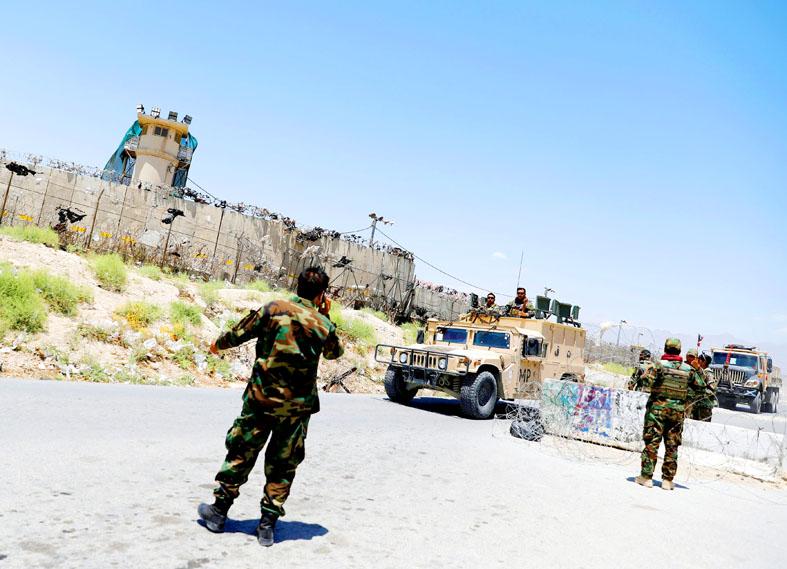All US and NATO troops have left the biggest air base in Afghanistan, officials said yesterday, signaling that the complete withdrawal of foreign forces from the country was imminent after two decades of war.
Bagram Air Base served as the linchpin for US-led operations in the rugged country, where the long war against the Taliban and their al-Qaeda allies started following the Sept. 11, 2001, attacks.
“The American and coalition forces have completely withdrawn from the base and henceforth the Afghan army forces will protect it and use it to combat terrorism,” Afghan Ministry of Defense spokesman Fawad Aman wrote on Twitter.

Photo: Reuters
A US defense official confirmed their departure, while the Taliban said it welcomed and supported the latest phase of the troop pullout.
“Their full withdrawal will pave the way for Afghans to decide about their future between themselves,” Taliban spokesman Zabihullah Mujahid said.
The US military and NATO are in the final stages of winding up involvement in Afghanistan, bringing home an unspecified number of remaining troops by a deadline of Sept. 11.
The Taliban have launched relentless offensives across Afghanistan in the past two months, gobbling up dozens of districts, as Afghan security forces have largely consolidated their power in the country’s major urban areas.
The ability of Afghan forces to maintain control of Bagram airfield would likely prove pivotal to maintaining security in Kabul and keeping pressure on the Taliban.
The exit of foreign forces from the base “symbolizes that Afghanistan is alone, abandoned and left to defend itself against the Taliban’s onslaught,” Australia-based Afghanistan expert Nishank Motwani said.
“Having reached home, Americans and allied forces will now watch what they fought so hard to build over 20 years burn down from afar, and knowing that the Afghan men and women they fought with risk losing everything,” Motwani said.

TRAGEDY STRIKES TAIPEI: The suspect died after falling off a building after he threw smoke grenades into Taipei Main Station and went on a killing spree in Zhongshan A 27-year-old suspect allegedly threw smoke grenades in Taipei Main Station and then proceeded to Zhongshan MRT Station in a random killing spree that resulted in the death of the suspect and two other civilians, and seven injured, including one in critical condition, as of press time last night. The suspect, identified as a man surnamed Chang Wen (張文), allegedly began the attack at Taipei Main Station, the Taipei Fire Department said, adding that it received a report at 5:24pm that smoke grenades had been thrown in the station. One man in his 50s was rushed to hospital after a cardiac arrest

A car bomb killed a senior Russian general in southern Moscow yesterday morning, the latest high-profile army figure to be blown up in a blast that came just hours after Russian and Ukrainian delegates held separate talks in Miami on a plan to end the war. Kyiv has not commented on the incident, but Russian investigators said they were probing whether the blast was “linked” to “Ukrainian special forces.” The attack was similar to other assassinations of generals and pro-war figures that have either been claimed, or are widely believed to have been orchestrated, by Ukraine. Russian Lieutenant General Fanil Sarvarov, 56, head

SAFETY FIRST: Double the number of police were deployed at the Taipei Marathon, while other cities released plans to bolster public event safety Authorities across Taiwan have stepped up security measures ahead of Christmas and New Year events, following a knife and smoke bomb attack in Taipei on Friday that left four people dead and 11 injured. In a bid to prevent potential copycat incidents, police deployments have been expanded for large gatherings, transport hubs, and other crowded public spaces, according to official statements from police and city authorities. Taipei Mayor Chiang Wan-an (蔣萬安) said the city has “comprehensively raised security readiness” in crowded areas, increased police deployments with armed officers, and intensified patrols during weekends and nighttime hours. For large-scale events, security checkpoints and explosives

PUBLIC SAFETY: The premier said that security would be tightened in transport hubs, while President Lai commended the public for their bravery The government is to deploy more police, including rapid response units, in crowded public areas to ensure a swift response to any threats, President William Lai (賴清德) said yesterday after a knife attack killed three people and injured 11 in Taipei the previous day. Lai made the remarks following a briefing by the National Police Agency on the progress of the investigation, saying that the attack underscored the importance of cooperation in public security between the central and local governments. The attack unfolded in the early evening on Friday around Taipei Main Station’s M7 exit and later near the Taipei MRT’s Zhongshan